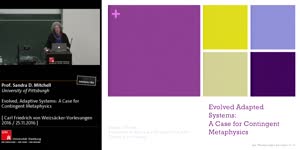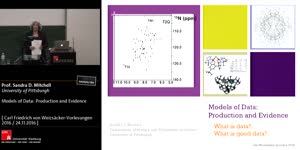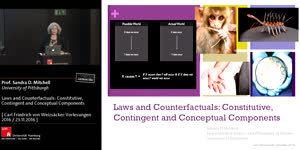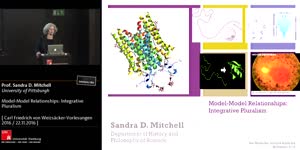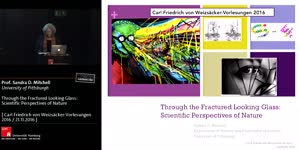Through the Fractured Looking Glass: Scientific Perspectives of Nature - Prof. Sandra D. Mitchell - University of Hamburg
- Lecture2Go
- Catalog
- F.5 - Geisteswissenschaften
- Philosophie
- Carl Friedrich von Weizsäcker-Vorlesung
Catalog
Through the Fractured Looking Glass: Scientific Perspectives of Nature
Science investigates the one universe in which we live and yet provides us with multiple explanations, predictions, and representations of the natural phenomena that constitute that universe. Competing accounts make up some of this pluralism. But why does science use diverse, compatible models of the very same phenomenon, and how are such models related to each other? These lectures will offer a perspectival answer. Scientific models provide different lenses through which to “see” natural systems. Perspectivism, and its correlate, partiality of representation make sense of model pluralism. Especially for complex phenomena, different perspectives cannot and should not be unified into a single representation that purports to perfectly mirror nature. By using multiple models, science improves our understanding, and better enables us to achieve our goals. This lecture series explores how the contingent and pragmatic features of scientific knowledge warrant an integrative, pluralist epistemology. The philosophical considerations will be illustrated with examples from scientific practice. These include explanations of the open-ended evolution of adapted systems and predictions of the structure of functional proteins.
---
Die diesjährigen Carl Friedrich von Weizsäcker-Vorlesungen finden vom 21. – 25. November 2016 statt und werden von Professor Sandra D. Mitchell zum Thema
“Through the Fractured Looking Glass: Scientific Perspectives of Nature“
gehalten. Professor Mitchell ist eine international renommierte Wissenschaftstheoretikerin, die an der University of Pittsburgh lehrt und forscht.
Zum Inhalt der Vorlesungen: “Science investigates the one universe in which we live and yet provides us with multiple explanations, predictions, and representations of the natural phenomena that constitute that universe. Competing accounts make up some of this pluralism. But why does science use diverse, compatible models of the very same phenomenon, and how are such models related to each other? These lectures will offer a perspectival answer. Scientific models provide different lenses through which to “see” natural systems. Perspectivism, and its correlate, partiality of representation make sense of model pluralism. Especially for complex phenomena, different perspectives cannot and should not be unified into a single representation that purports to perfectly mirror nature. By using multiple models, science improves our understanding, and better enables us to achieve our goals. This lecture series explores how the contingent and pragmatic features of scientific knowledge warrant an integrative, pluralist epistemology. The philosophical considerations will be illustrated with examples from scientific practice. These include explanations of the open-ended evolution of adapted systems and predictions of the structure of functional proteins.“

